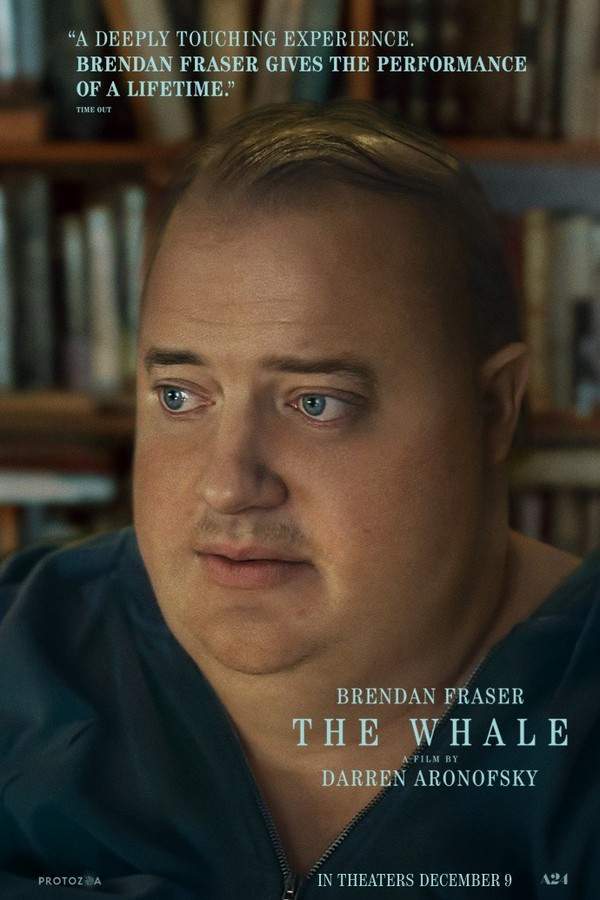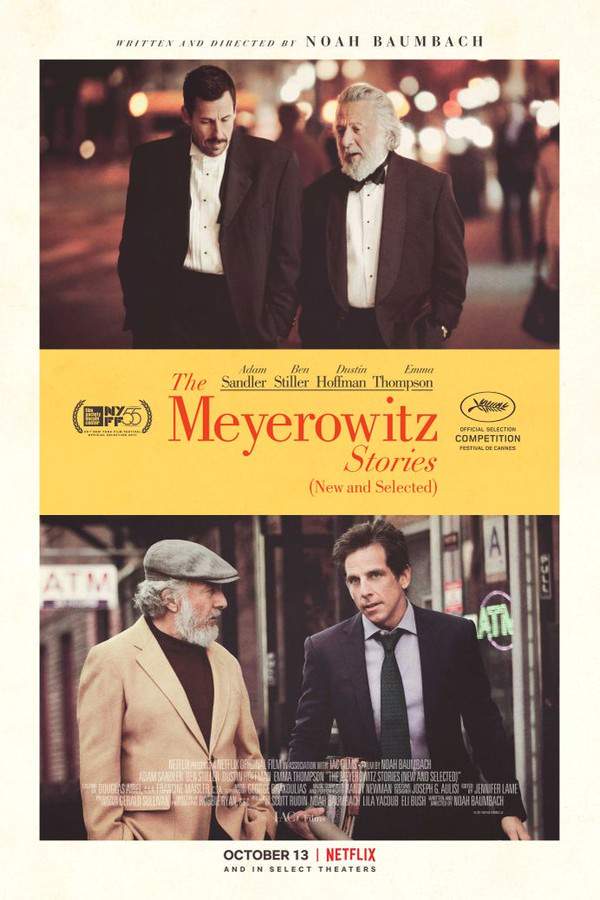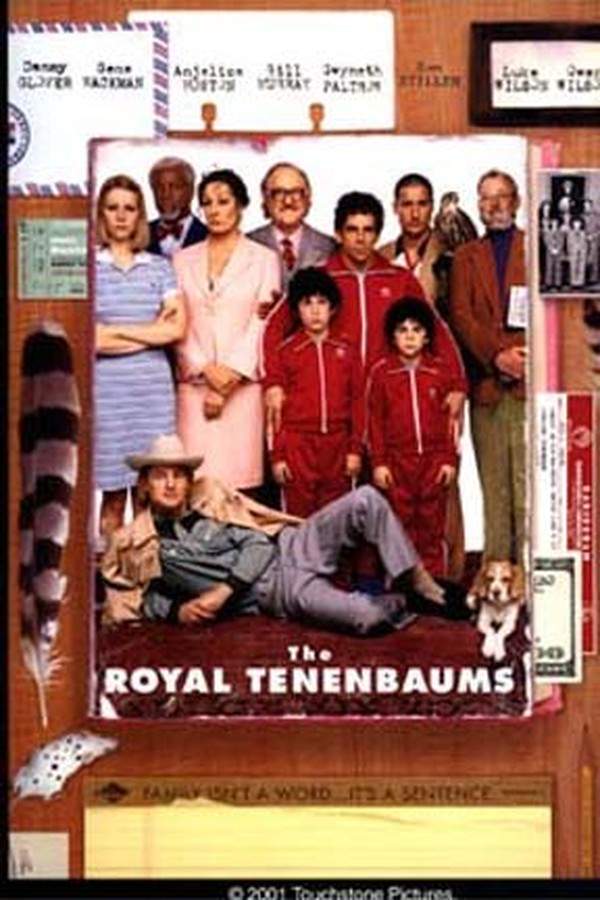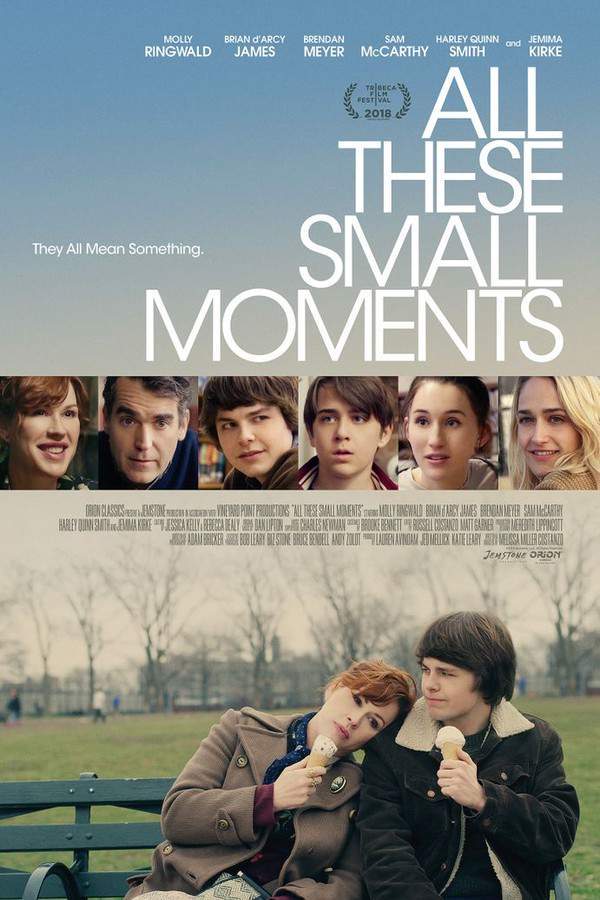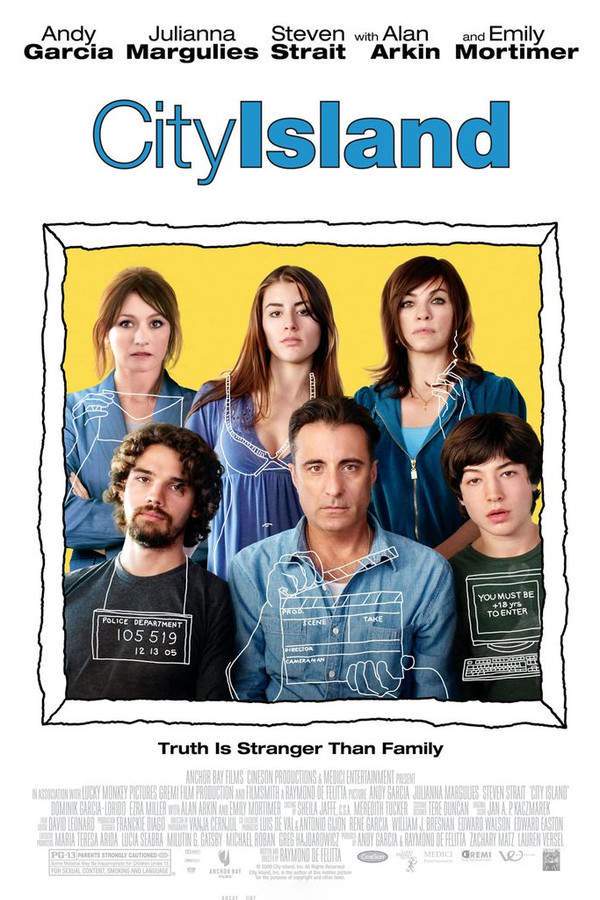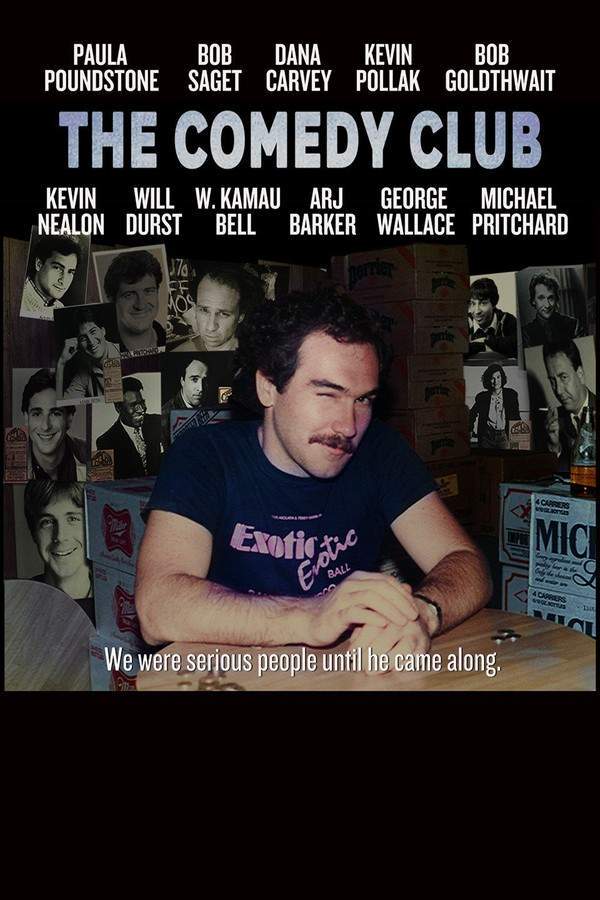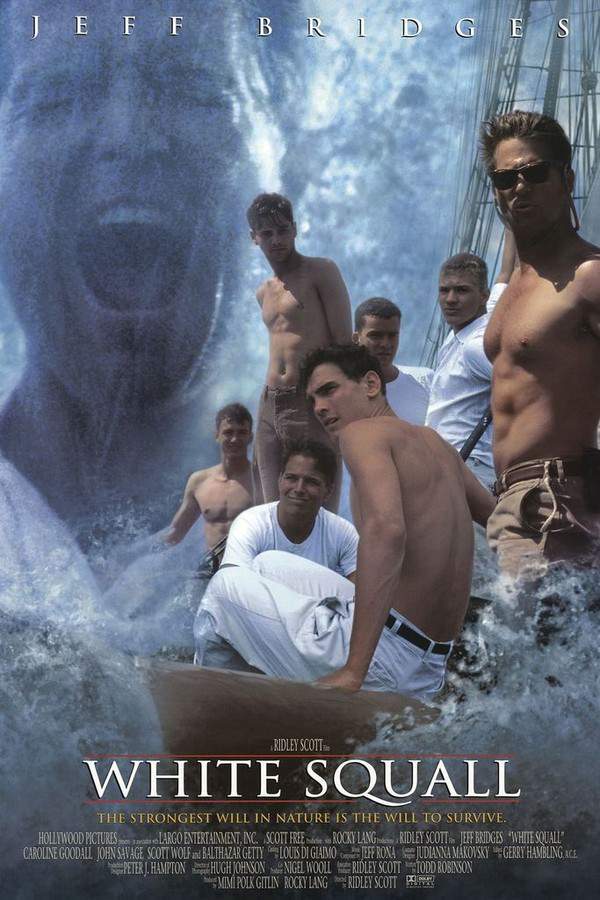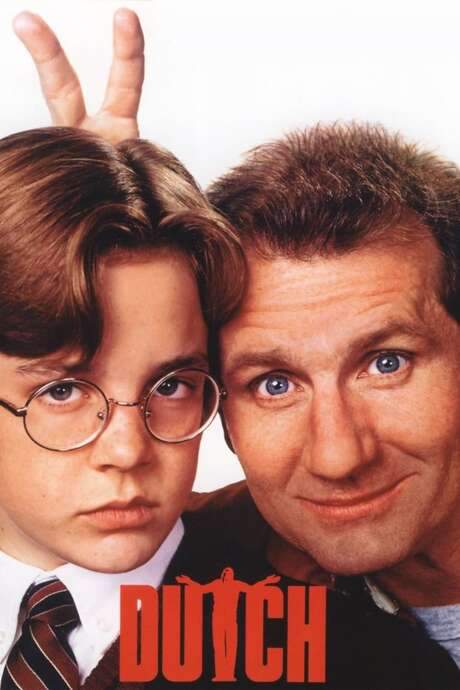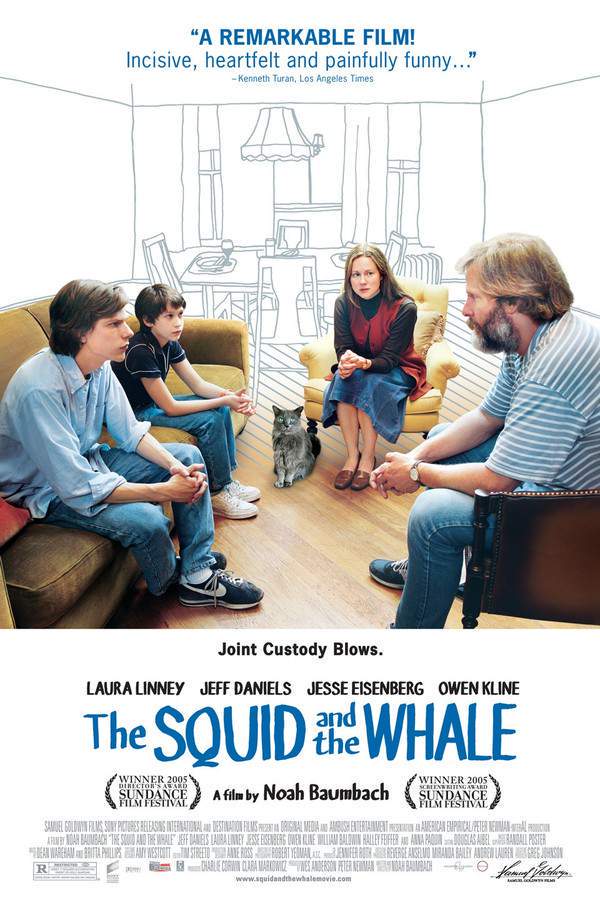
The Squid and the Whale 2005
Directed by

Noah Baumbach
Made by
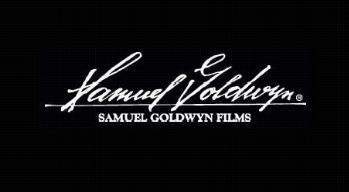
Samuel Goldwyn Films
Test your knowledge of The Squid and the Whale with our quiz!
The Squid and the Whale Plot Summary
Read the complete plot summary and ending explained for The Squid and the Whale (2005). From turning points to emotional moments, uncover what really happened and why it matters.
It is 1986, and we meet Bernard Berkman, an increasingly arrogant novelist whose once-bright career has dimmed significantly, leaving him unable to secure an agent for his work. Meanwhile, his wife, Joan, has recently begun to gain considerable acclaim for her own writing, which only fuels the existing tension in their marriage.
In a crucial moment, Bernard and Joan reveal to their two sons—Walt, who is 16, and Frank, who is just 12—that they have decided to separate. Bernard moves to a rental house just across Prospect Park, while the couple agrees on joint custody, aiming to share equal time with their children. However, their relationship turns combative, exacerbating the situation.
As time goes on, Joan starts a romantic relationship with Ivan, Frank’s tennis instructor, while Bernard finds solace in the company of Lili, one of his students at the new residence. The boys find themselves caught in the middle of their parents’ conflicts, choosing sides in the escalating battle: Frank aligns himself with their mother, and Walt, looking up to his father, sides with Bernard, blaming Joan for the upheaval.
Both brothers exhibit signs of distress caused by the divorce, showcasing their internal turmoil in markedly different ways. Frank, overwhelmed by the situation, begins to engage in risky behaviors at school, including drinking beer and mimicking Ivan’s characteristics, further complicating his emotional state. Walt, on the other hand, idolizes his father, attempting to emulate his actions, which leads to the deterioration of his relationship with Sophie, his girlfriend. After performing at his school’s talent show, where he falsely claims to have written “Hey You” by Pink Floyd, he garners applause from peers and family. However, when the truth comes out, the fallout draws the school’s attention, necessitating a meeting with Bernard and Joan regarding Walt’s behavior. It’s agreed that Walt should seek therapy to address his struggles.
During therapy, Walt begins to view his life more objectively, free from his father’s biases. When prompted for a happy memory, he recalls how his mother used to take him to see the awe-inspiring yet frightening giant squid and whale exhibit at the American Museum of Natural History. The memory evolves from fear to fondness as they discuss it together at home, highlighting Joan’s nurturing role since Bernard’s presence often felt lacking.
The tension reaches a boiling point with a fierce argument between Bernard and Joan about custody, which culminates in Bernard collapsing outside their home. After being rushed to the hospital, Bernard requests Walt to remain by his side, but in a poignant moment of realization, Walt chooses to visit the Natural History Museum instead. The film concludes with him standing in front of the exhibit he once feared but can now fully face, symbolizing his growth and newfound understanding of his family dynamics.
The Squid and the Whale Timeline
Follow the complete movie timeline of The Squid and the Whale (2005) with every major event in chronological order. Great for understanding complex plots and story progression.
Introduction to Bernard Berkman
In 1986, we meet Bernard Berkman, an increasingly arrogant novelist whose career is on the decline. Once a prominent figure in literature, he now struggles to find an agent for his work, highlighting the frustrations of his creative journey.
Joan's Accolades Rise
As Bernard's career falters, his wife Joan begins to gain significant acclaim for her own writing. This rising success creates further tension in their already strained marriage, as Bernard grapples with feelings of jealousy and inadequacy.
Announcement of Separation
In a pivotal moment, Bernard and Joan reveal to their sons, Walt and Frank, their decision to separate. This news creates immediate turmoil within the family, as both boys are forced to confront the reality of their shifting family dynamics.
Moving to a New Home
Following the separation announcement, Bernard moves into a rental house across Prospect Park. The couple agrees on a joint custody arrangement, aiming to share equal parenting time with Walt and Frank, but tensions continue to mount.
Joan's New Relationship
As the separation takes its toll, Joan embarks on a romantic relationship with Ivan, who is Frank's tennis instructor. This development further complicates the family situation, as the boys must navigate their evolving allegiances.
Bernard Finds Comfort
In his new home, Bernard finds solace in the company of Lili, one of his students. This new relationship offers him an emotional escape but also adds to the complexity of his situation with Joan and their children.
Divided Loyalties
Caught in an emotional crossfire, Walt and Frank choose sides in their parents' escalating conflict. Frank aligns himself with Joan, while Walt idolizes Bernard, leading to growing tensions between the brothers as they navigate their divided loyalties.
Frank's Risky Behavior
Frank, overwhelmed by the separation, begins to engage in risky behaviors at school, including drinking beer. His actions reflect his inner turmoil as he attempts to cope with the emotional fallout from his parents' divorce.
Walt's Struggle
Walt attempts to emulate his father, which strains his relationship with his girlfriend, Sophie. This emulation culminates in a talent show performance where he falsely claims authorship of 'Hey You' by Pink Floyd, leading to significant repercussions.
Meeting with Parents
After Walt's deception is revealed, a meeting with Bernard and Joan is arranged to address his behavior. The discussion culminates in an agreement that Walt should seek therapy, aiming to help him navigate his emotions more effectively.
Therapy and Self-Reflection
During therapy, Walt begins to see his life from a more objective standpoint, detached from his father's biases. He recalls a memory of visiting the giant squid and whale exhibit at the American Museum of Natural History, revealing a shift in how he views his past with Joan.
Understanding and Growth
As he discusses his memory in therapy, Walt's perception evolves from fear to fondness. This growth illustrates Joan's nurturing role, emphasizing the emotional void left by Bernard amid their family struggles.
Climactic Custody Argument
The mounting tension between Bernard and Joan erupts into a fierce argument over custody arrangements. This confrontation escalates dramatically, ultimately leading to Bernard's physical collapse outside their home.
Hospital Scene
After Bernard is rushed to the hospital, he requests that Walt remain by his side. However, in a moment of pivotal growth, Walt chooses to visit the Natural History Museum instead, symbolizing his desire for independence and understanding.
Conclusion and Acceptance
The film culminates with Walt standing before the giant squid and whale exhibit at the museum, a place he once feared. This moment signifies his emotional growth and newfound understanding of his family's complexities, showcasing his journey of acceptance.
The Squid and the Whale Characters
Explore all characters from The Squid and the Whale (2005). Get detailed profiles with their roles, arcs, and key relationships explained.
Bernard Berkman
Bernard is an increasingly arrogant novelist whose career has taken a downturn, leading him to be bitter and insecure. His struggles with self-worth and the impact of his failed marriage show his complex nature. His relationships with both his wife and sons reveal a man grappling with his failures and a longing for approval.
Joan Berkman
Joan is a rising novelist who faces her own challenges amidst the marital discord. Her newfound success contrasts sharply with Bernard’s decline, amplifying the tensions in their relationship. As a mother, she tries to nurture her sons while also pursuing her aspirations, leading to a multifaceted portrayal of a woman striving for independence.
Walt Berkman
Walt is a 16-year-old caught between his parents' conflicts, idolizing his father while struggling to reconcile his feelings. His behavior shifts from admiration for Bernard to moments of rebellion and introspection, particularly highlighted during therapy sessions. His journey illustrates the struggles of adolescence amidst familial upheaval.
Frank Berkman
At just 12 years old, Frank manifests his emotional turmoil through risky behaviors and a need for maternal support. His alignment with Joan reveals a desire for stability amidst chaos, showcasing the profound impact of their parents’ divorce on his self-expression. His journey towards self-discovery is also highlighted by his interactions with Ivan.
The Squid and the Whale Settings
Learn where and when The Squid and the Whale (2005) takes place. Explore the film’s settings, era, and how they shape the narrative.
Time period
1986
The year 1986 was marked by significant cultural and social shifts, particularly in the realm of family dynamics and personal relationships. It was a period when individualism in art and literature was gaining momentum, reflecting a broader conversation about personal identity and familial roles. The dynamics of marriage and divorce were evolving, becoming more visible in society's narrative.
Location
Prospect Park, American Museum of Natural History
Prospect Park is a large public park located in Brooklyn, New York, known for its beautiful landscapes, recreational opportunities, and serene environments. It's a central spot for families and individuals looking to escape the hustle of the city. The American Museum of Natural History, situated in Manhattan, is renowned for its extensive collections, including the captivating giant squid and whale exhibit, which plays a significant role in the film.
The Squid and the Whale Themes
Discover the main themes in The Squid and the Whale (2005). Analyze the deeper meanings, emotional layers, and social commentary behind the film.
💔
Divorce
Divorce serves as the central theme of the film, portraying the emotional turmoil experienced by each family member. The separation of Bernard and Joan affects not just their relationship but profoundly impacts their sons, Walt and Frank, leading to varied responses to their new reality. The exploration of how love can turn to animosity is vividly depicted through their interactions and decisions.
🧠
Identity
The journey towards self-awareness and identity is prominently featured, particularly through Walt's character. As he grapples with his father's influence and his own choices, he gradually learns to navigate his feelings about family dynamics. This theme underscores the importance of understanding oneself in the midst of chaos and external pressures.
🎭
Coming of Age
The film also explores the theme of coming of age, as both Walt and Frank confront the complexities of their emotions and familial expectations. Their growth is reflected in how they deal with loss, loyalty, and independence. The transition from childhood innocence to the more complex realities of adult relationships is a poignant aspect of their development.

Coming soon on iOS and Android
The Plot Explained Mobile App
From blockbusters to hidden gems — dive into movie stories anytime, anywhere. Save your favorites, discover plots faster, and never miss a twist again.
Sign up to be the first to know when we launch. Your email stays private — always.
The Squid and the Whale Spoiler-Free Summary
Discover the spoiler-free summary of The Squid and the Whale (2005). Get a concise overview without any spoilers.
In the humid summer of 1986, a tight‑knit Brooklyn neighborhood feels the tremor of change when a once‑celebrated novelist and his increasingly successful writer wife announce their separation. The film opens on the home of Bernard, a once‑brilliant author whose career has dulled, and Joan, whose literary voice is finally being heard. Their impending split sets the stage for a delicate, bittersweet comedy‑drama that captures the texture of a city whose brownstones and parkways echo with both nostalgia and the promise of new beginnings.
At the centre of this familial upheaval are two brothers, each trying to make sense of the shifting terrain. Sixteen‑year‑old Walt looks to his father for identity, absorbing his intellectual world and, at times, his cynicism. Twelve‑year‑old Frank leans toward his mother, drawn to her emerging confidence and creative spark. The brothers’ divergent loyalties create a quiet tension that mirrors the broader cultural pulse of 1980s Brooklyn—a place where ambition, art, and everyday survival intersect on the streets lined with graffiti and the scent of pizza ovens.
The tone balances wry humor with raw emotional honesty, framing the divorce not just as a legal split but as a catalyst for the characters to confront their own aspirations and insecurities. Bernard and Joan navigate their own artistic frustrations while trying to parent through a landscape that feels both familiar and suddenly alien. Their differing approaches to writing and life become metaphors for how each family member grapples with change, offering moments of both levity and poignancy.
Against this backdrop, the boys’ journey toward self‑discovery is punctuated by everyday scenes—a talent show, school hallway chatter, late‑night conversations—that hint at larger questions of identity, belonging, and the fragile ties that bind a family together. The film invites viewers to linger in the messy, tender space between childhood innocence and the stark realities of adulthood, promising an intimate portrait of a family in transition without revealing the specifics of what lies ahead.
Can’t find your movie? Request a summary here.
Movies with Similar Twists and Themes
Uncover films that echo the narrative beats, emotional arcs, or dramatic twists of the one you're exploring. These recommendations are handpicked based on story depth, thematic resonance, and spoiler-worthy moments — perfect for fans who crave more of the same intrigue.
Featured on this page

What's After the Movie?
Not sure whether to stay after the credits? Find out!
Explore Our Movie Platform
New Movie Releases (2026)
Famous Movie Actors
Top Film Production Studios
Movie Plot Summaries & Endings
Major Movie Awards & Winners
Best Concert Films & Music Documentaries
Movie Collections and Curated Lists
© 2026 What's After the Movie. All rights reserved.


